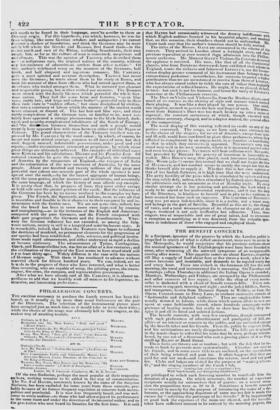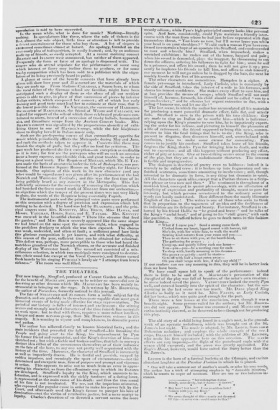THE BENEFIT CONCERTS.
Jr a foreigner, ignorant of the process by which the London public is propelled in search of what is called amusement, were now to anive in the Metropolis, he would conjecture that his previous notions about the musical ignorance of the English people must have been founded in error, after witnessing all the outward symptoms of an unappeasable craving after music. This appetite comes on about Easter—requiring till May a supply of food about four or five times a week, when it be- comes ravenous and insatiable, and demands to be regaled every day and every hour. From one o'clock in the forenoon till five the next morning, the vocal and instrumental din is unceasing. On Tuesdays and Saturdays (often Thursdays in addition) the Italian Opera is crowded; Mondays, Wednesdays, and Fridays, are occupied by the Philharmonic and other concerts of less repute ; while the shop of every music- seller is darkened with a cloud of benefit concert-bills. Eve ry con- cert-room ieengaged, morning rind night ; and the jaded fiddlers, fluters, and trumpeters, hasten from Hanover Square to Willis's, or from the Opera Concert-room to Drury Lane, to enchant successive crowds of "fashionable and delighted auditors." Thus are employed the hours usually devoted to labour, while those which nature allots to rest are spent at sotne fushionrible crowd, where hundreds congregate under pretence of hearing music, but really to show how heartily they de- spise it and all its hired and unhired notions. The benefit concerts, with very few exceptions, though announced with such profuseness of advertisement and prodigality uf bill, are affairs of no interest or concern to the publir, and are Illtlieeded except by the benefit-hiker and his friends. From the public lie expects little, and his anticipations are rarely disappointed. The bills are displayed in the music-shops in order that his name fluty be seen, pet haps remem- bered, by one out of a thousand who cast me passing glance at it us they stroll up Regent or Bond Street. These baits are thrown out ut random.; but witlt the fish that he in- tends to hook he proceeds more systematically. Circulars are setet. to his friends, and in some cases tie-kits are enclosed, on the speculation of their being retained and paid for. It often happens Out they are paid for and not used—and sometimes the reverse, used mid not paid for. Clubs and lodges are visited for the purpose of " niakiug a bene- fit ;" and the singing members of the Catch Club, " 'Sending Ion-, a nd i 1$ a suppliant's key. With 'hatol breath, awl whiveting humbleness,"
are privileged to solicit each listening member to vouchsafe him the donation of a guinea. On which occasions, the number of expectant recipients usually far ouniumbere that of payers : urn a recent occa- sion the proportions were as 18 to 3. Sometimes u benefit concert is resorted to merely for the purpose of introducing the mane of a de- butante, or the approaching departure of some modest fair is made the excuse for " soliciting the patronage of her fliends." If by importunity or good luck the expenses of the room are cleared, and the benefit- taker have sufficient interest to be noticed by the morning papers, the
.lpecttlation is said to have succeeded. In she mean while, what is done for music? 'Nothing-literally nothing,. In speculation, like these, where the sale. of tickets is the fr-t, almost the sole object, little time or attention Is left to provide a decent entertainment (or those who buy them. A list of singers is renounced sometimes utmost at hazard: An apology, founded on the ever-ready plea of indisposition, is easily framed ; and, by MI audience made up of friends, as easily accepted. At a recent morning concert Basirmst and IVANOEF Wel e announced, but neither of them appeared. Frequently the fortis or Wee of an apology is dispensed with. The singers who do attend stipulate for the performance of some song „ides interest or fancy nosy incline them to produce, or for some trashy composition %vinyls has been sold to a publisher with the stipu- lation of its being previously heard in publit. A glance at some of the benefit concerts that have already been .given will show bow poor and ilLassurted are the materials of which thee are made up From MIAMI..., CARADOItl, a Saxon born, to whom the'vocal riches of the German school are familiar, might have been anticipated such a display of them as she alone of all our resident artists is able to give, in place of that suecessiosi of pieces by inferior Italian writers, which composed her concert ; all of which her early training and good taste must lead her to estimate at their true, that is the lowest possible value. To VAUGHAN, the successor of HARRISON, the asq)ciate or Barrrsemms, the friend of WEBBE and Csisscorr, we looked for support of the scheol which these celebrated professors con- nibuted to adorn, instead of a stmeession of trashy ballads, harmonized ails, and threudbare scraps from the Ancient Concert books. Mrs. Suswe's concert was signalized by the preposterous nbsurdi:y of exhi- biting Geist in one of Ilsssost.'s songs, while the fair baificiaire chose to display herself in Italian music only. Such are the predisposing causes of that extraordinary appetite for music which periodically afflicts the Metropolis during May und June, and such the methods taken to aopease it. Concerts like these may furnish the staple of puffs, but they offer no food for criticism. The past week has produced the first exception-an exception as creditable as it is rare; for few arc the purveyors who will on such an occasion incur a heavy expense, considerable tisk, and great trouble. in order to bring out a great work. The Requiem of Mozs ter, which Mr. E. TAY- los made the basis of an oratorio moles the title of Redeniptian, was per- formed at the Hanover Square Rooms on Tuesday night, for Hoses's benefit. Our opinion of this work in its new character (and any other would be superthoms) was given after its performance at the last Norwich and Worcester Festivals ; and this WitS the first time of its being publicly heard sit any convert in the Metropolis. This fact suffieiently accounts for the necessity of removing the objection which Lad banished the finest sacred work of .Mozater from our orchestras,- an objection which the temper of the present times was not very likely to abate, the words of the Requiem being essentially Popish. The instrumental parts and the principal voice parts were performed on this occasion with a degree of precision and expression which left nothing to he desired. The band was led by BLAGROVE ; SIII1 the prin- cipal singers were Mrs. Ktsvverr, Miss Bitten, Miss HAWES, 111141 Messrs. VAUGHAN, HOBBS, SALE, MO E. TAYLOR. Mrs. KNYVETT Was encored in the beautiful chorale " There like streams that feed the garden ;" and Miss BIRCH scarcely appeared like the same singer we had heard on the same spot the previous night, when engaged in the profitless drudgery to which she was then expcsed. The chorus was weak, undecided, and often at fault ; a sufficient proof how little this glorious composition is yet known, and with what difficulty, at this season of the year, sufficient time can be obtained for rehearsal. This defect was, perhaps, more perceptible to those who had heard the matchless grandeur of the Norwich chorus, or the accurate and finished display of the Worcester band. The second act consisted of a mis- cellaneous selection, in which two madrigals were consigned to destruc- tion (their usual fate except at the Vocal Concerts), and Hones earned fresh laurels by his singing PURCELL'S lovely air " I attempt from love's sickness." The room was well filled.



























 Previous page
Previous page